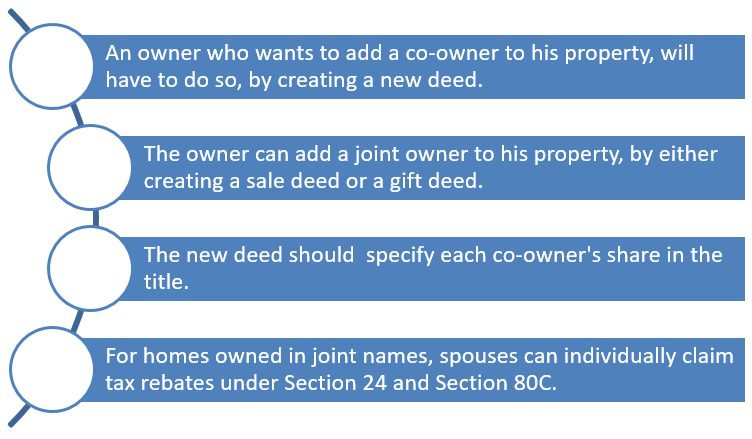Property owners have the option to grant co-ownership of their houses, flats, apartments and land parcels, at any point in their lives. Even though the reasons for such a step might be different in each individual case, creating a co-owner in a property is primarily done, to avoid conflicts that may arise during the distribution of the property after the owner’s death.
However, a mere verbal agreement is not the right way to add a joint owner to your property. Similarly, you cannot simply declare that you have decided to add a co-owner in the property. If you add your children’s name to the existing deed, an interest would be created in their benefit. However, they will not automatically inherit your share of the property after you and your own ownership interest would still be subject to probate.
An owner who wants to add a co-owner to his property, will have to do so by way of creating a new deed altogether. This new deed must also be registered at the sub-registrar’s office, to attain a legal validity under the Transfer of Property Act.

Types of deeds for transferring partial rights in a property
There are two ways in which the owner can add a joint owner to his property. He can either create a sale deed or a gift deed.
Sale deed: This transaction takes the form of a typical sale. In this process, a new sale deed must be created, clearly mentioning the portion of the property that is being transferred in the name of the co-owner. As with all sale deeds, this deed must be registered at the sub-registrar’s office of the area concerned. Stamp duty and registration charges would be applicable at the time of registration of the new sale deed.
Gift deed: Property ownership can also be shared by way of gifting a portion of the asset to the intended beneficiary. In this process, a deed of gift must be executed and duly registered at the sub-registrar’s office of the area concerned. Stamp duty and registration charges would be applicable at the time of registration of the gift deed.
See also: How to remove illegal possession from your property?
Clarity of title
In the new deed, clarify how you and your co-owner would share the title. If you want to share it equally, joint tenancy with right of survivorship would come into picture. In this case, if one of you dies, the ownership automatically passes to the other. In case of an unequal share, the co-ownership would be tenancy in common.
See also: Types of joint ownership of property
Stamp duty and registration charges for sale deed/ gift deed
| Type of deed | Stamp duty | Registration charge |
| Sale deed | 4%-8% of property value, depending on the state. | 1% of the property value. |
| Gift deed | 2% of the property value. | 1% of the property value. |
See also: Stamp duty and tax on gift deed of property
Implications of adding a co-owner on home loans
In case the owner is still servicing a home loan on the property that he plans to partially gift or sell, he will have to inform the bank about the whole arrangement. To add a co-owner, the bank would have to create a new home loan agreement, which must be registered after paying the due stamp duty and registration charges.
The bank would also insist on making the co-owner a co-borrower in the home loan applicable. The bank will follow its standard procedures and do a background check on the creditworthiness of the new party. The owners will have to pay all the charges, according to the bank’s policies.
See also: Coparcener meaning in HUF context
Income tax implications of adding a co-owner to a property
For homes owned in joint names, spouses can individually claim tax rebates under Section 24 and Section 80C of the income tax law. On the future sale of the property, the co-owners will have to pay capital gains tax, proportionate to their share in the property.
See also: Home loan tax benefits
Word of caution
Adding a co-owner to your property, is a scenario that must not be entered into lightly. It must be a well thought-out decision, on the part of the original owner, since it involves costs and control issues. The co-owner, for instance, has proprietorship over the property.
The original owner will have to consult with the co-owners, for future sale and distribution of the said property. The new owner can also decide whether he wants to live in the house or rent it out. He is also free to sell or mortgage his share in the property. To avoid these issues, the new deed must clearly mention the kind of right that you want to provide to the new co-owner.
See also: All about prohibited property
FAQs
How can I add a co-owner in my property?
A co-owner can be added to a property, by executing a sale deed or a gift deed.
How to make a gift deed for property?
As per the Transfer of Property Act, the transfer of a house property under a gift, has to be effected by a registered instrument/document, signed by or on behalf of the person gifting the property and should also be attested by at least two witnesses.







